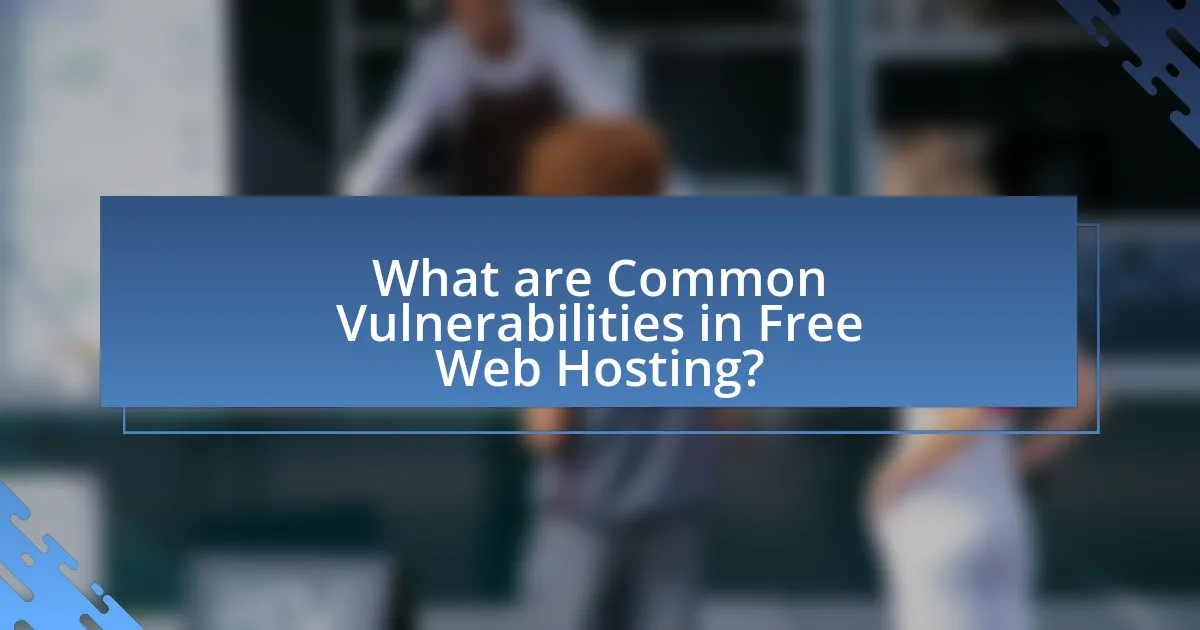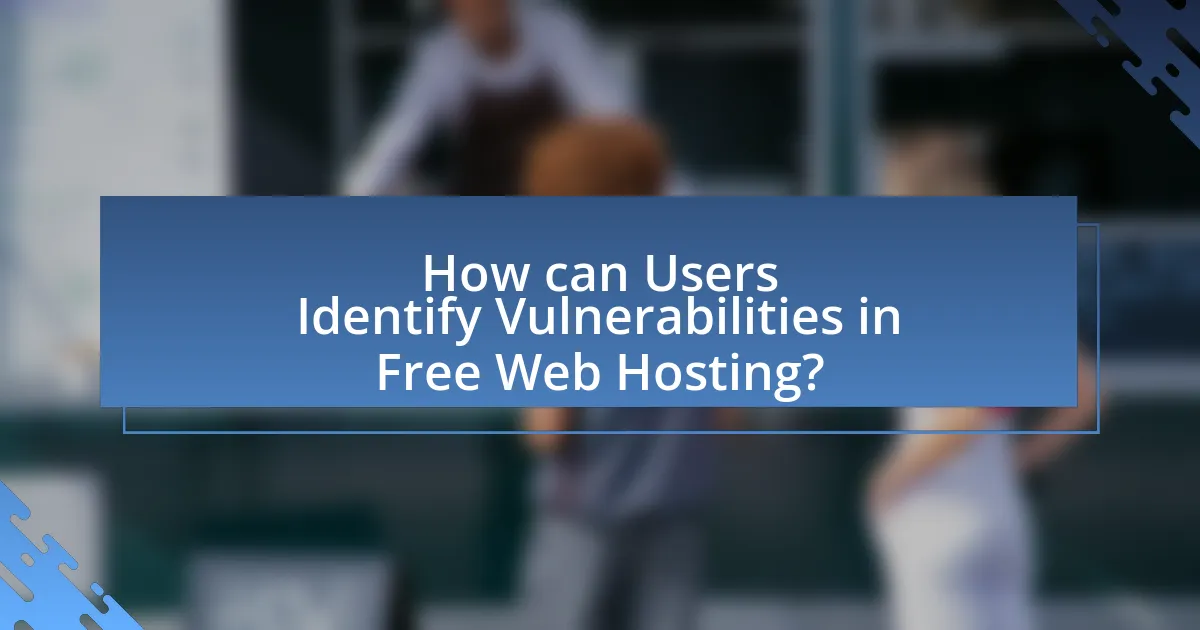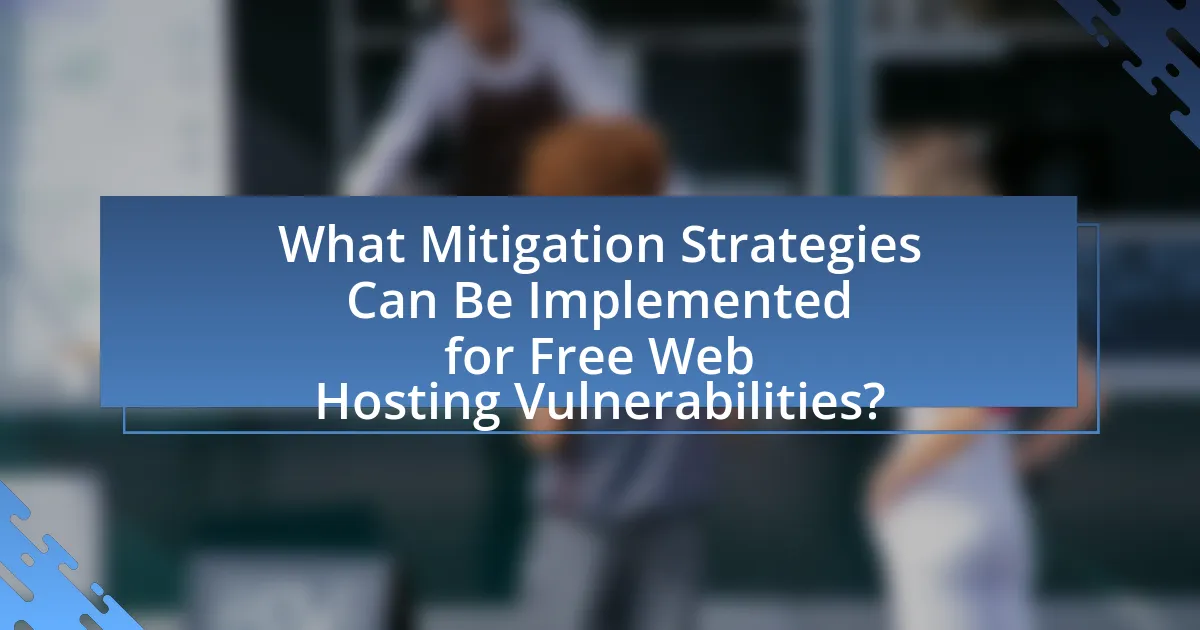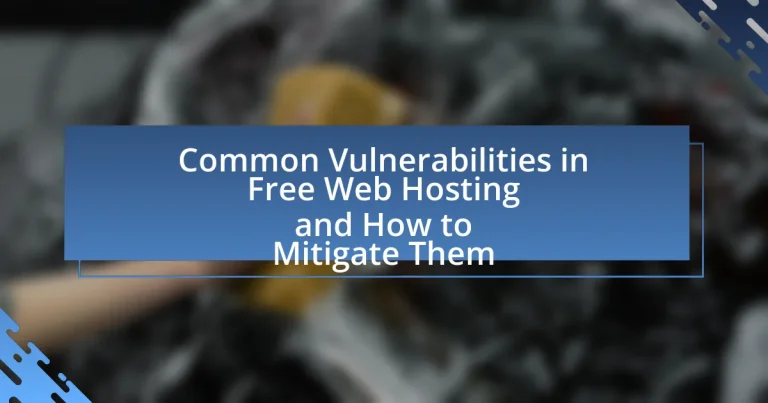The article focuses on common vulnerabilities associated with free web hosting services and strategies for mitigating these risks. It highlights issues such as inadequate security measures, outdated software, and shared resources that increase susceptibility to cyberattacks. The discussion includes the impact of these vulnerabilities on website security, the types of sensitive data at risk, and the potential consequences like downtime and data loss. Additionally, it outlines effective mitigation strategies, including strong password policies, regular software updates, and the use of security tools, while emphasizing the importance of user awareness and proactive measures to enhance security in free web hosting environments.

What are Common Vulnerabilities in Free Web Hosting?
Common vulnerabilities in free web hosting include inadequate security measures, lack of regular updates, and shared resources that expose websites to attacks. Inadequate security measures often result from limited budget allocations, leading to weak firewalls and insufficient intrusion detection systems. Lack of regular updates can leave software and applications vulnerable to known exploits, as many free hosting providers do not prioritize maintenance. Additionally, shared resources mean that if one website on a server is compromised, others can be affected, increasing the risk of cross-site scripting and other attacks. These vulnerabilities are documented in various cybersecurity reports, highlighting the importance of choosing reliable hosting services that implement robust security protocols.
How do these vulnerabilities impact website security?
Vulnerabilities in free web hosting significantly compromise website security by exposing sites to unauthorized access, data breaches, and malware infections. These vulnerabilities often arise from inadequate security measures, such as weak authentication protocols and outdated software, which can be exploited by attackers. For instance, a study by the Ponemon Institute found that 60% of small businesses experienced a cyber attack due to vulnerabilities in their web hosting services. This highlights the critical need for robust security practices to mitigate risks associated with free web hosting environments.
What types of data are most at risk from these vulnerabilities?
Sensitive personal information, such as usernames, passwords, and financial data, is most at risk from vulnerabilities in free web hosting services. These vulnerabilities often arise from inadequate security measures, making it easier for attackers to exploit weaknesses and gain unauthorized access to user accounts. For instance, a study by the Ponemon Institute found that 60% of small businesses experienced a data breach due to poor security practices, highlighting the significant risk associated with free hosting platforms.
How can vulnerabilities lead to website downtime or data loss?
Vulnerabilities can lead to website downtime or data loss by allowing unauthorized access to systems, which can result in data breaches, server crashes, or malicious attacks. For instance, SQL injection attacks exploit vulnerabilities in web applications, enabling attackers to manipulate databases, potentially leading to data loss or corruption. According to a report by the Ponemon Institute, 60% of small businesses that experience a data breach go out of business within six months, highlighting the severe impact of such vulnerabilities. Additionally, denial-of-service (DoS) attacks can overwhelm servers, causing prolonged downtime and disrupting access to the website. These incidents underscore the critical need for robust security measures to protect against vulnerabilities that can compromise website integrity and availability.
Why are free web hosting services more prone to vulnerabilities?
Free web hosting services are more prone to vulnerabilities due to limited resources and inadequate security measures. These services often lack the financial backing to implement robust security protocols, leading to outdated software and insufficient monitoring. For instance, a study by the University of California found that free hosting platforms frequently use shared servers, which increases the risk of cross-site scripting and other attacks, as vulnerabilities in one site can compromise others on the same server. Additionally, the absence of dedicated support teams means that security issues may go unaddressed for longer periods, further exacerbating the risk of exploitation.
What limitations do free web hosting services impose on security measures?
Free web hosting services impose significant limitations on security measures, primarily due to their lack of control over server configurations and limited resources. These services often do not provide essential security features such as SSL certificates, firewalls, or regular security updates, making websites more vulnerable to attacks. Additionally, free hosting platforms may share server space among multiple users, increasing the risk of cross-site scripting and data breaches. According to a study by the University of California, Berkeley, shared hosting environments are 30% more susceptible to security incidents compared to dedicated hosting solutions.
How does the lack of resources affect the security of free web hosting?
The lack of resources significantly compromises the security of free web hosting by limiting the ability to implement robust security measures. Free web hosting services often operate on minimal budgets, which restricts their capacity to invest in advanced security technologies, regular software updates, and comprehensive monitoring systems. Consequently, this lack of investment leads to vulnerabilities such as outdated software, inadequate firewalls, and insufficient data encryption, making these platforms attractive targets for cyberattacks. For instance, a study by the Ponemon Institute found that organizations with limited security budgets experience 50% more breaches than those with adequate funding, highlighting the direct correlation between resource allocation and security effectiveness.
What are the most common types of vulnerabilities found in free web hosting?
The most common types of vulnerabilities found in free web hosting include inadequate security measures, outdated software, and lack of user authentication. Inadequate security measures often result from limited resources allocated to free hosting services, making them susceptible to attacks such as cross-site scripting (XSS) and SQL injection. Outdated software is prevalent because free hosting providers may not prioritize regular updates, leaving systems exposed to known exploits. Additionally, the lack of robust user authentication can lead to unauthorized access, as many free hosting platforms do not enforce strong password policies or two-factor authentication. These vulnerabilities are documented in various cybersecurity reports, highlighting the risks associated with using free web hosting services.
What is the significance of shared hosting vulnerabilities?
Shared hosting vulnerabilities are significant because they expose multiple users on the same server to potential security risks, allowing attackers to exploit weaknesses in one account to gain access to others. This interconnectedness means that a single compromised account can lead to data breaches, unauthorized access, and service disruptions for all users on that server. For instance, a study by the Ponemon Institute found that 60% of organizations experienced a data breach due to vulnerabilities in shared hosting environments, highlighting the critical need for robust security measures in these setups.
How do outdated software and plugins contribute to security risks?
Outdated software and plugins significantly contribute to security risks by leaving systems vulnerable to exploitation. When software is not updated, it lacks the latest security patches that address known vulnerabilities, making it easier for attackers to gain unauthorized access. For instance, according to a report by the Cybersecurity and Infrastructure Security Agency (CISA), 60% of breaches are linked to unpatched vulnerabilities. This highlights the critical need for regular updates to mitigate risks associated with outdated software and plugins.

How can Users Identify Vulnerabilities in Free Web Hosting?
Users can identify vulnerabilities in free web hosting by conducting security assessments, including vulnerability scanning and manual testing. Security assessments involve using tools like Nessus or OpenVAS to scan for known vulnerabilities in the hosting environment. Additionally, users should review the hosting provider’s security policies and practices, as many free services may lack robust security measures. According to a 2021 report by the Cybersecurity and Infrastructure Security Agency (CISA), free web hosting services often expose users to risks such as outdated software and lack of encryption, which can be identified through thorough examination and testing.
What tools can be used to scan for vulnerabilities?
Various tools can be used to scan for vulnerabilities, including Nessus, OpenVAS, and Qualys. Nessus is widely recognized for its comprehensive vulnerability scanning capabilities, offering over 60,000 plugins to detect vulnerabilities across various systems. OpenVAS is an open-source alternative that provides a robust scanning framework and regularly updated vulnerability tests. Qualys, a cloud-based solution, enables continuous monitoring and scanning for vulnerabilities, making it suitable for organizations seeking real-time insights. These tools are validated by their extensive use in the cybersecurity industry, demonstrating their effectiveness in identifying and mitigating vulnerabilities in web hosting environments.
How effective are vulnerability scanners for free web hosting?
Vulnerability scanners are moderately effective for free web hosting, primarily due to the limited control users have over the hosting environment. These scanners can identify common vulnerabilities such as outdated software and misconfigurations, but their effectiveness is often hampered by the lack of comprehensive access to the underlying infrastructure. For instance, a study by the University of California, Berkeley, found that while scanners can detect 80% of known vulnerabilities, they may miss issues specific to shared hosting environments, where multiple users share resources. Therefore, while vulnerability scanners provide valuable insights, their effectiveness is constrained in free web hosting scenarios.
What manual checks can users perform to identify risks?
Users can perform several manual checks to identify risks in free web hosting environments. These checks include reviewing server configurations for default settings, examining file permissions to ensure they are not overly permissive, and analyzing website code for vulnerabilities such as SQL injection or cross-site scripting. Additionally, users should check for outdated software versions and ensure that security patches are applied. Conducting regular backups and monitoring logs for unusual activity can also help in identifying potential risks. These practices are essential as they help in recognizing vulnerabilities that could be exploited by attackers, thereby enhancing the overall security posture of the web hosting environment.
What signs indicate that a free web hosting service may be insecure?
Signs that indicate a free web hosting service may be insecure include the lack of HTTPS encryption, which exposes data to interception, and the absence of regular security updates, leaving the service vulnerable to known exploits. Additionally, if the hosting provider does not offer customer support or has a poor reputation for uptime and reliability, it may indicate inadequate security measures. Furthermore, if the service imposes excessive advertisements or limits on resources, it can suggest that the provider prioritizes profit over security. These factors collectively highlight potential risks associated with using free web hosting services.
How can users recognize phishing attempts or malware infections?
Users can recognize phishing attempts or malware infections by identifying suspicious emails, messages, or websites that exhibit unusual characteristics. Common indicators include poor spelling and grammar, generic greetings, and requests for personal information. Additionally, users should be cautious of links that lead to unfamiliar or misspelled domains, as well as attachments from unknown sources. According to the Anti-Phishing Working Group, in 2022, 83% of phishing attacks involved email, highlighting the importance of vigilance in email communications. Recognizing these signs can help users avoid falling victim to cyber threats.
What user feedback should be considered when assessing security?
User feedback that should be considered when assessing security includes reports of suspicious activity, user experiences with security features, and suggestions for improvements. Specifically, users often highlight vulnerabilities they encounter, such as phishing attempts or data breaches, which can provide insight into potential weaknesses in the security framework. Additionally, feedback on the usability of security measures, like two-factor authentication, can indicate whether these features are effective or need enhancement. Collectively, this feedback helps identify common vulnerabilities and informs strategies for mitigation in free web hosting environments.

What Mitigation Strategies Can Be Implemented for Free Web Hosting Vulnerabilities?
Mitigation strategies for free web hosting vulnerabilities include implementing strong password policies, regularly updating software, utilizing web application firewalls, and conducting regular security audits. Strong password policies reduce the risk of unauthorized access, while software updates patch known vulnerabilities, enhancing security. Web application firewalls filter and monitor HTTP traffic, providing an additional layer of protection against attacks. Regular security audits help identify and address potential weaknesses in the hosting environment. These strategies collectively strengthen the security posture of free web hosting services, reducing the likelihood of successful exploits.
How can users enhance security on their free web hosting accounts?
Users can enhance security on their free web hosting accounts by implementing strong passwords and enabling two-factor authentication. Strong passwords reduce the risk of unauthorized access, as studies show that 81% of data breaches are linked to weak passwords. Two-factor authentication adds an additional layer of security, making it significantly harder for attackers to gain access even if they have the password. Additionally, users should regularly update their software and plugins to patch vulnerabilities, as outdated systems are often targeted by cybercriminals. Regular backups of website data also ensure that users can recover quickly in case of a security breach.
What role does regular software updates play in security?
Regular software updates are crucial for maintaining security as they patch vulnerabilities that could be exploited by attackers. These updates often include fixes for known security flaws, which, if left unaddressed, can lead to unauthorized access, data breaches, and other cyber threats. For instance, a report by the Cybersecurity & Infrastructure Security Agency (CISA) highlights that 60% of breaches are linked to unpatched vulnerabilities. Therefore, consistently applying software updates significantly reduces the risk of exploitation and enhances the overall security posture of systems, particularly in environments like free web hosting that may be more susceptible to attacks.
How can strong passwords and two-factor authentication improve security?
Strong passwords and two-factor authentication significantly enhance security by making unauthorized access more difficult. Strong passwords, characterized by a combination of letters, numbers, and symbols, reduce the likelihood of being guessed or cracked through brute-force attacks. According to a study by the National Institute of Standards and Technology (NIST), weak passwords are responsible for 81% of data breaches. Two-factor authentication adds an additional layer of security by requiring a second form of verification, such as a text message code or authentication app, which makes it harder for attackers to gain access even if they have the password. The use of both strong passwords and two-factor authentication can reduce the risk of account compromise and protect sensitive information from unauthorized access.
What best practices should users follow to minimize risks?
Users should follow best practices such as using strong, unique passwords, enabling two-factor authentication, and regularly updating software to minimize risks associated with free web hosting. Strong passwords reduce the likelihood of unauthorized access, as studies show that 81% of data breaches are linked to weak passwords. Two-factor authentication adds an additional layer of security, making it harder for attackers to gain access even if passwords are compromised. Regular software updates patch vulnerabilities, as 60% of breaches exploit known vulnerabilities that could have been mitigated through timely updates.
How can users effectively back up their data on free web hosting services?
Users can effectively back up their data on free web hosting services by utilizing automated backup tools provided by the hosting service, manually downloading files via FTP, and regularly exporting databases. Automated backup tools often create scheduled backups, ensuring data is consistently saved without user intervention. Manual downloads via FTP allow users to transfer website files directly to their local storage, providing an additional layer of security. Regularly exporting databases, typically in formats like SQL, ensures that critical data is preserved and can be restored if needed. These methods collectively enhance data security and mitigate the risks associated with vulnerabilities in free web hosting services.
What security plugins or tools are recommended for free web hosting?
For free web hosting, recommended security plugins and tools include Wordfence, Sucuri Security, and iThemes Security. Wordfence offers a comprehensive firewall and malware scanner, which is essential for protecting websites from common threats. Sucuri Security provides monitoring and malware removal services, enhancing the overall security posture. iThemes Security focuses on hardening WordPress installations, offering features like two-factor authentication and brute force protection. These tools are widely recognized for their effectiveness in mitigating vulnerabilities associated with free web hosting environments.
What are the common troubleshooting steps for vulnerabilities in free web hosting?
Common troubleshooting steps for vulnerabilities in free web hosting include updating software, reviewing permissions, scanning for malware, and monitoring logs. Updating software ensures that known vulnerabilities are patched, as outdated applications are prime targets for exploitation. Reviewing permissions helps to limit access to sensitive files and directories, reducing the risk of unauthorized access. Scanning for malware identifies malicious code that may have been injected into the website, allowing for timely removal. Monitoring logs provides insights into unusual activities, enabling quick responses to potential security breaches. These steps are essential for maintaining the security and integrity of websites hosted on free platforms, where resources and support may be limited.


